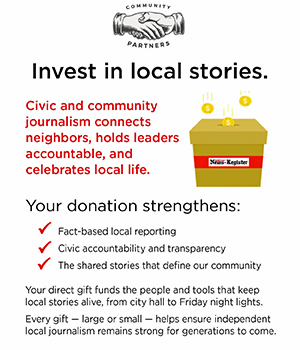Rohse: It's time to manage those minutes
I’m often out of sorts because I don’t have enough time. True, I am allotted exactly the same number of hours and minutes as you, but I would just like more time in each day.
Although I am getting my share, it doesn’t decrease my complaining.
I go to bed about 10 or 11 every night and get up about 6 a.m. That doesn’t give me many minutes to get done what I would like to get done in an entire day. No wonder that takes a lot of minute scrimping.
When I was a housewife and cooking every day, I devised a budget for groceries. I admit that often I didn’t keep it — for example, when I wanted to have a party — but it was at least a goal and kept me aware of how much money I was spending for food.
We liked artichokes, but if on a particular shopping day they were too expensive, I’d put off that purchase and buy something else that was perhaps on sale.
Why is it, then, that I don’t budget my time, when time is more precious than money?
It occurred to me yesterday that I hadn’t called my good friend, Lena, for a long time, but I remembered, too, that when we talk, the conversations sometimes are interminable.
I picked up the phone and we had a wonderful conversation. We had much catching up to do, but when I hung up, I realized we had talked for an hour and 10 minutes — a great big chunk out of the total time allotment for that day. But I enjoyed the phone call, so that time investment was a good one.
It is strange that we do not take time to more carefully budget our time. I balance my bank statement every month and I’m careful about my checking account, but I throw my time around as if it were chicken feed. And yet I am happy with my days and the way I’m spending my time. It’s just that I want to squeeze more into my given minutes and invest my time perhaps more wisely.
Not long ago, I realized how cavalier I was with my time when I read the average American spends an hour every day just looking for misplaced objects: reading glasses, car keys, billfold, telephone, shopping list, and all else.
I realized I was guilty of that. I probably was losing more than an hour every day because I always was wondering where I’d left my glasses. And where was my last page of notes? I knew where I had put them, but they weren’t there.
And my car keys were not in that last purse I had used. So where were they? I couldn’t find my friend’s telephone number. I assuredly was going to have to do something about that hour I was losing every day.
After that disturbing information, I read more and learned the average number of things in an America home is 300,000, so no wonder I couldn’t find anything — and I suspect my home has more than that. The same article mentioned the amount of clutter due to disorganization is about 80%.
I needed to shape up.
I was receiving my fair share of time, just as was everyone else, but I was not balancing my time account. How foolish it was to spend time resolving an artichoke purchase and not consider what I was going to do in the next two hours.
I sought advice about good financial investments, so it was logical I needed a time guru to help me get the most out of my time.
One suggestion made by the time gurus is to ask yourself what your time is worth. That made me gulp. I know well that time might be called one’s most precious possession, yet I was investing it as a high school student invests her week’s allowance on sodas. But having a soda is fun and isn’t that what an allowance, in part at least, is for?
Just as I bought Jane Bryant Quinn’s “Making the Most of Your Money” and other similar books, I purchased books about time management and found them interesting.
I particularly appreciated the suggestions about the value of taking time for a break. I agree. I practice that. And they emphasize its worth even when you’re swamped.
It is suggested, too, that I keep track of my time so I can determine whether I am spending it wisely instead of letting it slip away.
I’m advised to focus effort on lost time so I can correct the problem.
One chapter tells me how to save time. I read it a couple of times and here are a few things that were suggested:
We should establish work patterns — such as a consistent time to leave the day’s work. And don’t make it too late.
Another thing: Learn to say no. True, it’s hard to say no to a good friend, but it’s often necessary if you value your time — and you, of course, know you cannot say yes to everything. If you establish this habit, you’ll realize its worth.
I was glad to read why it was that I should save time. It might let me take advantage of new learning opportunities or improve other aspects of my life. It can lower stress. For some, it might even lead to a new career.
And a To Do list is highly recommended. I have long believed in such a list and make one every night. But I become too enthusiastic imagining what I shall do on the morrow. I admit sometimes I am quite exhausted just by the length of the list and seldom, very seldom, do I get all those assignments done the next day. If even some are crossed out, I am glad.
I’m told when I undertake a big job I don’t relish and have been postponing, the answer is to take just one small bit of that job at a time. Get that done, and then, since it didn’t seem so unpleasant after all, on the next day, get another chunk out of the way. Keep completing little parts of the job, one at a time, and then one day, you will realize that you have left only a small part of that big, unpleasant task and the job then will be done.
The time gurus frown on procrastination. If you have a big project that must be done by next Tuesday, go after it with gusto this very day. How glad you will be on Tuesday, and how happy you will be with your completed work.
That brings up another aspect in which time is quite different from money. Whereas we may invest money for later return, go ahead and enjoy your newfound time.
It doesn’t keep well, and it is likely that you will derive pleasure from it however you spend it. Just don’t waste it.
Something else: Write everything down. Use the notes app on your smart phone or a traditional notebook and pen that you always have nearby.
If you have tasks that require your attention each week, note them on your schedule. Establish a time and stick to it.
Other things to keep in mind: Prioritize to focus on the most vital tasks first. Accomplish the important things at the start of the day to avoid leaving big jobs undone. Do smaller ones last.
Group together similar tasks — such as emails or phone calls.
Finish what’s almost done, as mentioned. Don’t put off the non-glamorous jobs — the ones you don’t like to do.
Although freezing temperatures and winter are coming, we can’t freeze time. Rather, we must learn to manage it more efficiently.
The goal of time saved is to realize something from it, such as learning or satisfaction. Time can be a dear friend if we but carefully cultivate its pleasures.
Elaine Rohse can be reached at rohse5257@comcast.net.













Comments